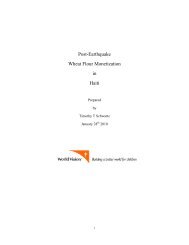Right to Livelihoods in Haiti
Focus on egg production and rural household livelihood strategies
Focus on egg production and rural household livelihood strategies
Create successful ePaper yourself
Turn your PDF publications into a flip-book with our unique Google optimized e-Paper software.
14<br />
Importance of Understand the Adaptability of Rural <strong>Haiti</strong>an Livelihood Strategies<br />
What we see <strong>in</strong> household livelihood strategies and the rural market system described above are patterns<br />
and relationships sometimes difficult for development practitioners who have not lived and worked <strong>in</strong> the<br />
region <strong>to</strong> fully grasp. An exam<strong>in</strong>ation of local livelihood strategies among the majority of farmers <strong>in</strong> rural<br />
<strong>Haiti</strong>, particularly those who do not have access <strong>to</strong> illicit bus<strong>in</strong>ess opportunities or relatives <strong>in</strong> Miami,<br />
suggests they differ little from those practiced dur<strong>in</strong>g the pre-Columbian and buccaneer eras 350 <strong>to</strong> 500<br />
years <strong>in</strong> the past and are far less technologically and organizationally complex than those that prevailed<br />
dur<strong>in</strong>g the colonial epoch. The anachronistic character and tenacity with which people all over <strong>Haiti</strong> cl<strong>in</strong>g<br />
<strong>to</strong> these strategies and their resistance <strong>to</strong> adopt<strong>in</strong>g or ma<strong>in</strong>ta<strong>in</strong><strong>in</strong>g new material and organizational<br />
technologies is a major impediment <strong>to</strong> the success of most programs f<strong>in</strong>anced by <strong>in</strong>ternational<br />
development agencies. It confounds foreign development workers and corporate <strong>in</strong>ves<strong>to</strong>rs who come <strong>to</strong><br />
<strong>Haiti</strong>. Yet, from the perspective of adaptation <strong>to</strong> crisis the system is em<strong>in</strong>ently logical.<br />
Adapted over the past 209 years of <strong>in</strong>dependence <strong>to</strong> periodic droughts that occur on average one <strong>in</strong> every<br />
eight years; the 25 wars and upris<strong>in</strong>gs and 60 years of <strong>in</strong>ternational trade embargoes that occurred dur<strong>in</strong>g<br />
the 1800s, a trend that cont<strong>in</strong>ued through the 20th century with an equal number of violent<br />
conflagrations, civil unrest, revolution, and more embargoes <strong>to</strong> the first tumultuous 15 years of the 21st<br />
century, <strong>Haiti</strong>ans are stuck on an island surrounded on three sides by water and one side by a neighbor<br />
(the Dom<strong>in</strong>icans) who 78 years ago, under the <strong>in</strong>fluence of a despotic dicta<strong>to</strong>r dispatched convicts <strong>to</strong><br />
massacre, with blades and <strong>in</strong> the space of three days, 25,000 of those ethnic <strong>Haiti</strong>ans liv<strong>in</strong>g on their side<br />
of the border. The rural population has had little choice but <strong>to</strong> adapt. They have done so by cultivat<strong>in</strong>g<br />
dependency on those forces they can control: the technologically simple, <strong>in</strong>tegrated production,<br />
process<strong>in</strong>g, and market<strong>in</strong>g strategies seen above. xxiii<br />
In this way rural <strong>Haiti</strong>an household livelihoods can be conceptualized as survival-oriented strategies that<br />
l<strong>in</strong>k household, communities and ecological zones through the rotat<strong>in</strong>g market system, and <strong>in</strong> do<strong>in</strong>g so<br />
averages the impact of crisis out across the landscape. Part of the reason that it has been so effective is<br />
that <strong>Haiti</strong>'s mounta<strong>in</strong>ous terra<strong>in</strong> and correspond<strong>in</strong>g micro climates have meant that environmental crises<br />
that would impede production at the household level rarely impacts an entire region. When it does, such<br />
as with Hurricane Sandy of 2012, the people are able <strong>to</strong> turn for food <strong>to</strong> their garden and artisanal fish<strong>in</strong>g<br />
or <strong>to</strong> cash reserves of their mama lajan (market money); for new cash, they turn <strong>to</strong> the sale of lives<strong>to</strong>ck<br />
and charcoal production for the urban market. It should also be unders<strong>to</strong>od that up until the previous<br />
decade, all that is be<strong>in</strong>g described occurred, and has been occurr<strong>in</strong>g for 2 centuries, <strong>in</strong> the near <strong>to</strong>tal<br />
absence of State services. With the exception of tax<strong>in</strong>g animal sales and market vendors, provid<strong>in</strong>g<br />
security <strong>in</strong> the form of police, and assistance with education, the State has been largely absent. The vast<br />
bulk of road work, <strong>in</strong>vestment <strong>in</strong> irrigation, and agricultural extensions services have come from NGOs,<br />
missionaries, and <strong>in</strong>ternational agencies. Even here, many times over the past 50 years “development”<br />
and “relief” organizations have not helped but rather pulled out when the people <strong>in</strong> the region were faced<br />
with crises such as the political crises of 1991-1994 and 2002-2004. Thus, <strong>in</strong> formulat<strong>in</strong>g new strategies <strong>to</strong><br />
assist rural <strong>Haiti</strong>ans we should keep <strong>in</strong> m<strong>in</strong>d that, while not perfect <strong>in</strong> terms of bus<strong>in</strong>ess and maximiz<strong>in</strong>g<br />
profits, the strategies they practice made it possible for them survive extreme hardships, <strong>in</strong> an extreme<br />
environment and with very little outside help for over two centuries.<br />
Return<strong>in</strong>g <strong>to</strong> eggs, the most important po<strong>in</strong>t <strong>to</strong> understand <strong>in</strong> the previous summary of rural livelihood<br />
strategies <strong>in</strong> <strong>Haiti</strong> is that whatever the exact configuration of these livelihood strategies, the guid<strong>in</strong>g
















